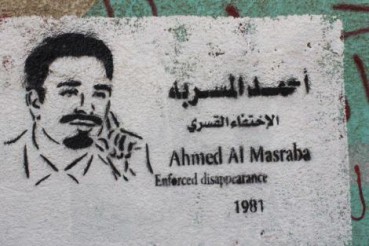Home » Yemen » Press Releases » YEM - News » Yemen: Is Ahmed Al-Masraba still alive after 30 years of disappearance?
Disappearances during the Cold War...
Until its reunification in 1990, Yemen was separated into two parts: northern Yemen allied to the Western Bloc, and southern Yemen which was aligned with the Soviet bloc. In this Cold War context, the Republic of North Yemen was the scene of a violent civil war beginning in 1962 opposing Marxist guerrillas, backed by the Republic of South Yemen and its Soviet allies, and northern Yemen governmental loyalist troops backed by the West.
As a consequence of this war, a systematic practice of enforced disappearance was undertaken by northern Yemen security forces against its opponents as of the early 1970s. This practice continued until 1990, when Yemen was re-unified.
In 1978, the Nasserite Unionist People's Organisation backed by southern Yemen tried to overthrow the President of northern Yemen, Ali Abdullah Saleh. In response to this coup attempt, loyalist security forces carried out a campaign of mass arrests against Nasserites, Baathists and all groups backed by South Yemen. Most of the people arrested during this period remain detained or disappeared today.
Although living in northern Yemen, Ahmed Ghanem Maarouf Al Masraba was a member of the Arab Socialist Baath Party, a left-wing party opposing the government of Northern Yemen. As a result of his political involvement and the violent civil war context, Mr Al Masraba decided to surrender to the authorities of North Yemen as he feared he would otherwise be killed.
On 17 December 1981, he left his home in the village of Medlab in Wusab, Dhamar Governorate in Northern Yemen to surrender himself. This was the last time his family saw him.
Since this day and for more than 30 years, his family has tried to obtain information – any information - about Mr Al Masraba's fate from officials but to no avail.
From Sana'a Political Prison to Belad Arrous Secret Prison?
Despite the lack of any official notification as to his whereabouts, Mr Al Masraba's family were able to learn that their loved one had first been held by military Intelligence in Sana'a and then in the Political Security prison of Sana'a as of 1984. His family was also given a list of names of people detained in Political Security's Sana'a prison (Waalan), which included Mr Al Masraba's name.
In 2003, his son, lawyer Rashid Al Masraba was informed by a security officer speaking anonymously that Mr Al Masraba had been transferred from Waalan prison to a secret prison located in Belad Arrous in the south of Sana'a. Mr Al Masraba's lawyer referred this new element to the authorities and again requested further investigations, still to no avail. Rashid Al Masraba brought his father's case before the Ministry of Human Rights, once before the revolution and a second time in 2012 but also without results.
In December 2012, a detainee named Mr Al Iryani was released from Belad Arrous prison after 27 years of secret detention. Mr Al Masraba's son met with him to see if his father was, or had been at some stage, detained at the jail. But Mr Al Iryani's physical and psychological state was so deteriorated that he was not able to provide any coherent information about his detention or his former co-detainees. This awful condition also attests to the fact that he was severely tortured during his detention, which makes us fear for Mr Al Masraba's physical and mental health. It is likely, as was the case for Mr Al Iryani, that many of those disappeared are detained in terrible conditions, which, following thirty years of detention, will likely have caused serious mental and physical scars.
Today, Alkarama asked the UN Working Group on Enforced Disappearance to intervene with the Yemeni authorities to ensure that investigations about Mr Al Masraba's fate immediately be initiated, and that if he is found to still be alive, he is immediately released, or at the very least, placed under the protection of the law. He should also be provided with all appropriate reparation and redress.
 Algeria
Algeria Bahrain
Bahrain Djibouti
Djibouti Egypt
Egypt Iraq
Iraq Palestine/Israel
Palestine/Israel Jordan
Jordan Kuwait
Kuwait Lebanon
Lebanon Libya
Libya Mauritania
Mauritania Morocco
Morocco Oman
Oman Qatar
Qatar Saudi Arabia
Saudi Arabia Sudan
Sudan Syria
Syria Tunisia
Tunisia United Arab Emirates
United Arab Emirates Yemen
Yemen Other Countries
Other Countries


